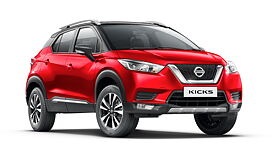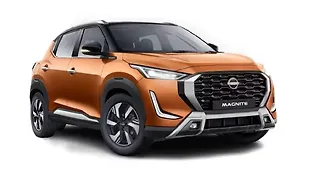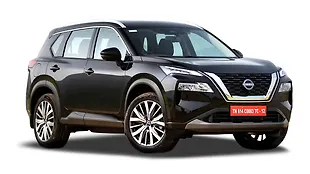Introduction

Introducing a new model in a fiercely contested segment is a tough task. But, aiming to take buyers away from heavyweights such as the Hyundai Creta or the Maruti Suzuki Brezza with a fairly lesser known badge is even harder. That’s the heroic task the new Nissan Kicks has taken upon itself as it shares showroom floor with popular crossovers. Unlike Nissan’s previous stab at this segment – the Terrano, which was basically a rebadged Renault Duster, the Kicks is an entirely new product. It’s a crossover built for city-dwellers to tackle everything the urban jungle can throw at it. Let’s take a look and see if it’s any good.
Design and style

Let’s talk numbers first. The Kicks is over 4.3 metres long, 1.8 metres wide and 1.65 metres in height, meaning it’s noticeably longer and wider than the Hyundai Creta but not as tall. Its 2673mm wheelbase, too, is longer than the Hyundai. As for the ground clearance, the Kicks stands tall and above the rest, at 210mm. All in all, it’s looking good so far but what about the design?
The production version retains the basic design cues taken from the Kicks concept first shown at the 2014 Sao Paulo Motor Show. You will find familiar Nissan design elements like the V-Motion grille, boomerang-style headlights and taillights, and the floating roof with a wrap-around look to the windscreen and side glass. With the C-pillar ‘hidden’ with a black finish that blends into the tailgate glass, it seems that the floating roof concept has been exaggerated on the Kicks, giving it a unique appearance when viewed from the rear. Speaking of the rear, it is arguably the best part of the exterior design as the extremely raked tailgate and the sharply-designed wraparound taillights are something that are new to this segment. For the India-spec model, Nissan has tinkered with a few things – unlike the Kicks that is sold overseas, the door sills on this car are actually part of the doors. Interestingly, Nissan says this redesign makes it easier to get in and out with traditional clothes.

You may or may not like the contrasting roof colour or the steeply raked D-pillar, however, there is no denying that these design features make the Kicks stand out from the pack. All in all, the Kicks is a fairly good looking crossover. It might not be as flamboyant or in-your-face as the Ecosport but then it’s not as simple looking as the Creta either. Being the longest and widest in its class, the Kicks has a good deal of road presence as well, which is a big plus in this segment.

Interior

As funky as the exterior is, the Kicks’ cabin is sophisticated in its design, surprisingly spacious and well finished for the most part. Unlike most new SUVs that seem to cram a lot of materials and switchgear on to their dashboard, the dash design in here is clean and straightforward. We especially like the simplicity of the centre console and the climate control panel. As for the quality, it’s a mixed bag. For starters, the middle part of the dash, door armrests and the middle armrest is covered in soft touch materials which lend a premium feel to the cabin. However, there are also shiny hard plastics on the door pads and the lower half of the dash. What affects the overall ambience further are the sheer number of old-design parts shared with existing Renault-Nissan products. The climate control panel, steering column mounted audio controls, cruise control switch and the window switches all come from the Duster and the Captur.

As for space and comfort, the dashboard is set slightly high, but there is a kink on the window line which improves sideward visibility. The front seats are adequately large and the generous side bolstering does a good job of keeping you in place. The legroom and headroom are great, too. The second row, meanwhile, is equally supportive with a bench that offers adequate thigh support and a nicely contoured backrest. The Nissan’s extra width over its competitor’s pays dividends as you get more lateral support than most of its rivals and to top it off, the backrest angle is close to perfect as well. The Kicks also offers air vents at the back and cup holders in the armrest for added convenience.

The second-half of the cabin isn’t as practical as we would like – there is no 60:40 split option for the seats and the 400-litre boot is down on capacity compared to the Kicks sold overseas. Fortunately, the loading area is fully flat and squared out, meaning it’s easier to stuff heavy items.

Safety and Equipment

You pay a high price for the top-spec XV (O) version but then you also get a long list of equipment as standard. The Kicks gets an entirely new infotainment system that comes with a slick eight-inch display. The floating screen, in fact, is of high quality and the touch response is great as well. It’s also the most loaded in this segment – you get smartphone mirroring tech, Apple CarPlay, Android Auto and built-in navigation. That said, our favourite feature is the surround camera view which uses four cameras to present a 360-degree view of the car. It’s something unheard of in this segment and inded, makes for a useful feature on every drive. This variant also gets LED projector headlights, functional roof rails with 100kg capacity, leather seats, climate control, automatic headlamps, automatic wipers, height adjustable driver’s seat and twin parcel shelf. In terms of safety, the Kicks comes with four airbags, ABS, EBD and speed sensing door locks as standard.

Engine, Performance and Braking

For this road test we have the more popular diesel version of the Kicks which can be best described as ‘competent’. Nissan has continued with the tried and tested 1.5-litre K9K diesel motor. However, we would like to add that there is a vast difference in the way the Kicks and the Captur/Duster behave on the road.
The Kicks and the Captur share the same engine which makes 110bhp/240Nm, but the level of refinement on the move is much higher with the former. The Kicks is significantly quieter thanks to better insulation and a more refined version of the same 1.5 motor – one can hardly hear the diesel clatter once the windows are up. What’s more, this new offering also accelerates in a more linear manner than the Captur when the motor is on boost. The engine feels more effortless in the mid-range than even the Creta’s 1.6-litre unit, however, there is still turbo lag under 2,000rpm, post which the Kicks pulls strongly till 4,000rpm.
There’s more than enough torque in the midrange to propel the Kicks through traffic without ever feeling like its engine is working too hard. In our acceleration and roll-on tests, the Kicks posted some quick numbers, hitting 100kmph from standstill in 11.66 seconds. It did 20-80kmph in third in just 6.79 seconds and took 8.76 seconds to accelerate from 40-100kmph in fourth, resulting in significantly quicker roll-on times compared to its rivals. To our surprise, even the clutch feel is different – it’s more precise and not too heavy. Speaking of the clutch, it’s paired to a slick-shifting six-speed manual gearbox that offers positive throws. The only downside, as we see it, is the lack of an automatic option for the diesel Kicks.

Ride and Handling

We have said it before and the fact remains that the Nissan’s B0 platform vehicles including the Duster, the Captur and now the Kicks are tremendously capable when it comes to dealing with rough roads. Naturally, the Kicks behaves better over bad roads than its rivals – it simply hovers across ruts and small potholes without unsettling itself. Yes, it is slightly stiff compared to the Creta but the trade-off to this is better high speed poise when driving over undulated roads. Perhaps the most impressive bit is the way it rebounds quickly from any sharp bump you might encounter, regaining composure almost immediately. Unfortunately, the Kicks also suffers from the high speed steering judder that’s present in the Captur and the Duster. When taking corners at high speeds, the steering judders quite a bit, something that could be unnerving for some drivers.
Price and Fuel Economy

On-road prices for the Kicks start at Rs 11.20 lakhs for the base XL petrol trim, going all the way till Rs 17.64 lakhs for the top-spec XV Pre diesel that we have here. As for the all-important fuel efficiency, the diesel version returned 12.90kmpl in the city and 16.12kmpl on the highway under our testing cycle.
Verdict

All things considered, the Nissan Kicks is a rather interesting proposition. It’s the longest and widest in its class and it’s not just the proportions that Nissan seems to have gotten on point. The Kicks looks the part, too, without appearing overdone. The real question here though is whether the Kicks advances the crossover game forward for Nissan. It’s definitely improved over its siblings in many key areas including engine refinement, gearshift quality, cabin design and quality. However, it trails behind its rivals when it comes to interior fit and finish and drivetrain options. The lack of a diesel automatic in a market that’s rapidly accepting the convenience of a self-shifting AMT is bound to hurt the sales and we hope Nissan India addresses this by introducing either an AMT or a full-on automatic for the diesel Kicks.
Specification
| CAR NAME | Nissan Kicks |
| Variant | XV (O) 1.5D |
| ENGINE | |
| Fuel | Diesel |
| Installation | Front, transverse |
| Displacement | 1461cc |
| Bore/stroke | 76mm/80.5mm |
| Valve gear | 4 valves per cyl |
| Power | 109bhp at 3850rpm |
| Torque |
240Nm at 1750rpm |
| Power to weight | - |
| Torque to weight | - |
| Gearbox | 6-speed manual |
| CHASSIS & BODY | |
| Kerb weight | 1400kg |
| Tyres (F/R) | 215/60 R17 |
| Spare | Full Size |
| STEERING | |
| Type | Rack and pinion |
| Type of assist | Electric |
| Turning circle | 10.5m |
| BRAKES | |
| Front | Ventilated Discs |
| Rear | Discs |
| Anti-lock | Yes |
Test Data
| CAR NAME | Nissan Kicks |
| Variant | XV (O) 1.5D |
| PERFORMANCE & BRAKING | |
| 0-20kph | 1.49s |
| 0-40kph | 3.64s |
| 0-60kph | 5.83s |
| 0-80kph | 8.43s |
| 0-100kph | 11.66s |
| 0-120kph | 15.93s |
| 20-80kph in 3rd gear | 6.79s |
| 40-100kph in 5th gear | 8.76s |
| 80-0kph | 2.23s / 24.55m |
| FUEL ECONOMY | |
| City | 12.90kmpl |
| Highway | 16.12kmpl |
| Tank size | 50-litres |
| Range | 625km |
| INTERIOR MEASUREMENTS | |
| Front | |
| Legroom(Max/min) | 820/630mm |
| Headroom(Max/min) | 970/930mm |
| Shoulder room | 1320mm |
| Backrest height | 630mm |
| Rear | |
| Legroom(Max/min) | 840/640mm |
| Ideal legroom | 680mm |
| Headroom | 950mm |
| Shoulder room | 1320mm |
| Seat base length | 470m |
| Backrest height | 590mm |
| Boot | |
| Length/width/height | 960/990/510mm |
| Loading lip height | 730mm |

























